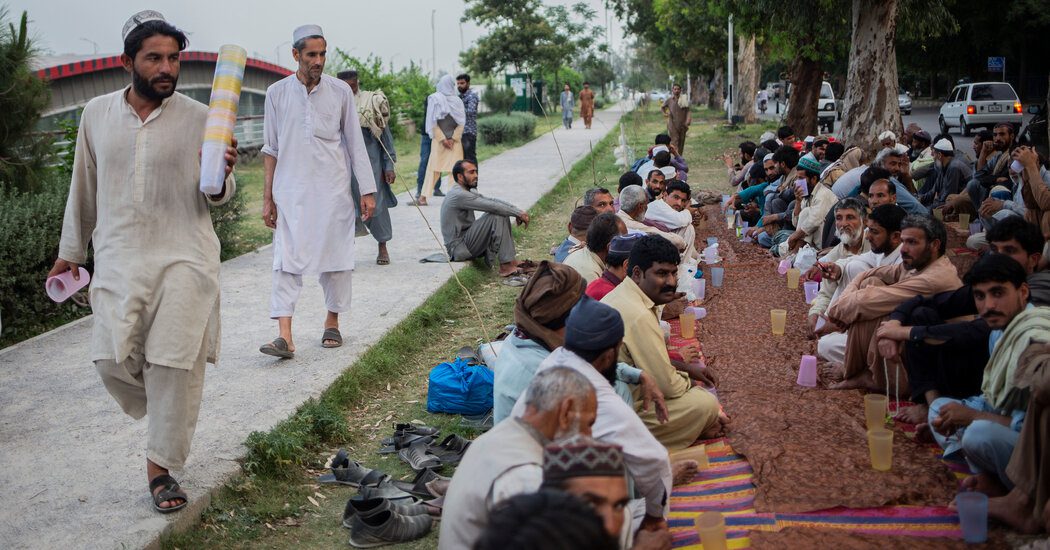Global Courant 2023-04-17 12:00:14
The crowds begin to form at dawn. They swell throughout the day as hundreds of men and women wrapped in bright purple and pink scarves wait outside the gates of the charity in Karachi, Pakistan. Many sit for hours desperately searching for enough flour, rice, sugar and cooking oil to break their daily fast for the holy month of Ramadan.
“Ramadan is for fasting, praying and celebrating, but in Pakistan inflation is forcing people to queue and die in stampedes to get free food,” said Muhammad Aziz, a textile worker, 52, while in the crowd waited. “It’s the most expensive and priceless Ramadan of my life.”
Across Pakistan, the season of Ramadan – a time of daily fasting and late-night family celebrations – is in full swing. But this year an economic crisis, which has pushed the price of goods to record highs, has dampened celebrations for millions of families struggling to buy the dates, rice and meat needed to break their daily fast.
The South Asian country, home to more than 230 million people, is facing one of the greatest economic challenges in its history.
When Ramadan started last month, inflation was at a record 35.4 percent — the highest in nearly five decades — according to government figures. Severe flooding last fall destroyed much of the country’s agricultural belt, destroying wheat crops and damaging farmland for years to come. And because Ukraine exports essential grains, the war there has further strained Pakistan’s food supply, officials say.
Rising prices have fueled the anger of many Pakistanis. After Prime Minister Imran Khan was ousted in a no-confidence vote last year, many hoped that the new government, led by Shehbaz Sharif, would put an end to inflation that had begun to rise under Khan’s tenure.
Instead, prices of necessities have continued to rise as the government struggled to secure a rescue package from the International Monetary Fund. Some critics have also blamed the government, accusing the country’s political elite of being preoccupied with the drama surrounding Mr Khan’s political comeback and distracted from dealing with the economic crisis.
“Pakistan’s ruling elite has failed to provide aid to the people, and nothing will prevent the latter’s anger from falling on the former in the coming weeks and months,” said Uzair Younus, the director of the Pakistan Initiative at the Atlantic Council. “This is a confluence of economic, political and security crises in Pakistan and must be seen as the most serious threat to the country’s cohesion since 1971.”
The economic desperation among Pakistanis has played out in grim scenes across the country during Ramadan. Since the holiday began nearly a month ago, at least 22 people have been killed and dozens injured in stampedes and long lines as people struggle to get some of the food distributed by charities and the government across the country.
In one of the most devastating episodes, 11 women and children died in a mob last month after hundreds gathered outside a factory hoping to get a 20-pound sack of flour and $3.50 in cash from a local philanthropist.
Even charities are struggling.
It is during Ramadan that many Pakistanis donate their religiously prescribed annual zakat, or alms, often to charitable organizations that prepare food parcels for distribution to the poor. But this year, skyrocketing prices and tight donor income have left charities with less to distribute.
“This Ramadan, the volume of ration bags has decreased dramatically, mainly due to a decrease in donations, while the number of needy people approaching us has increased significantly,” said Shakeel Dehalvi, a civil servant at the Alamgir Welfare Trust, a leading charity in the country. Karachi.
Those who cannot receive charity have bought what they can. In Khyber Pakhtunkhwa, a province bordering Afghanistan, the price of flour has more than doubled since the beginning of last year.
In recent years, Pakistan has been importing wheat from Ukraine to meet the needs of the province, which is home to 18 percent of the country’s population. But with that supply disrupted by war, Russia is now the country’s largest exporter of wheat.
The government has started an initiative to provide subsidized flour during Ramadan and has set up distribution points for donated flour. But in Khyber Pakhtunkhwa, according to local officials, mismanagement and overcrowding have plagued these efforts.
Thousands of needy people rush to the distribution points every day, but many return empty-handed in the evening because there are not enough sacks of flour to meet the rising demand. In Peshawar and other major cities in Khyber Pakhtunkhwa province, police regularly fire tear gas and charge the crowd with batons to disperse them. In some areas, angry mobs have stormed trucks full of flour sacks.
On a recent afternoon, Ashraf Mohmand, a 34-year-old construction day laborer, stood anxiously outside a government distribution point in Peshawar. He said he had not received a single sack of flour despite waiting in long queues for the past two days.
“I only earn three dollars a day – not enough to even feed my three children,” said Mr. Mohmand.
Rising costs have only added to his frustration with a government he hoped would turn the economy around after coming to power last April.
“Shehbaz Sharif has proven himself to be worse than Imran Khan,” said Mr. Mohmand. “Everything costs double what it cost last year.”
Government officials have rejected such criticism.
This month, Ahsan Iqbal, a federal minister, said the new government had managed “not only to cope with the climate catastrophe” that caused $30 billion in damage and economic losses last year, but also to gradually stabilize the country despite the “failed economic policies” of the previous administration.
Yet the government has struggled in recent months to meet the terms of a 2019 deal worth $6.5 billion with the IMF and to release some of the funds that have stalled since November.
Economists say the government is in an almost impossible position.
The money-poor country needs IMF funding to avoid defaulting and falling into recession. But to meet the terms of the deal, officials must raise taxes and cut subsidies — measures that make basic necessities like food, gas and utilities even more expensive for the nation’s poorest.
“Food inflation has hurt those on the lowest incomes the most, as food baskets now account for more than 40 percent of their total monthly expenditures,” said Khaqan Najeeb, a former finance ministry adviser.
Last autumn’s floods, which killed more than 1,700 people and destroyed at least four million hectares of crops, have significantly exacerbated the crisis. In some of the hardest hit regions, stagnant floodwaters still cover vast farmlands. In places where the flood water has receded, the soil is also expected to be less fertile in the coming years.
Ghulam Muhammad, a farmer in the Dadu district of Sindh province, migrated to Karachi in November to earn a living as his land was still under water. “Floods have taken everything from me: my job, full sacks of wheat for the whole year and two goats,” he said.
Now Mr. Muhammad, 38, works as a private security guard for $86 a month, with no vacation.
To stretch his salary, he joins those queuing for free meals outside kiosks set up by charitable organizations around the city. Those meals, he said, kept his family from going to sleep hungry. Still, he’s more concerned about his family’s future every day, as more and more people come to the charity begging for food, he says.
“During Ramadan, it is a tradition for food stalls all over the city to offer free meals at sunset and before sunrise,” said Mr. Muhammad. “But when the holy month is over, where will we find free food?”




